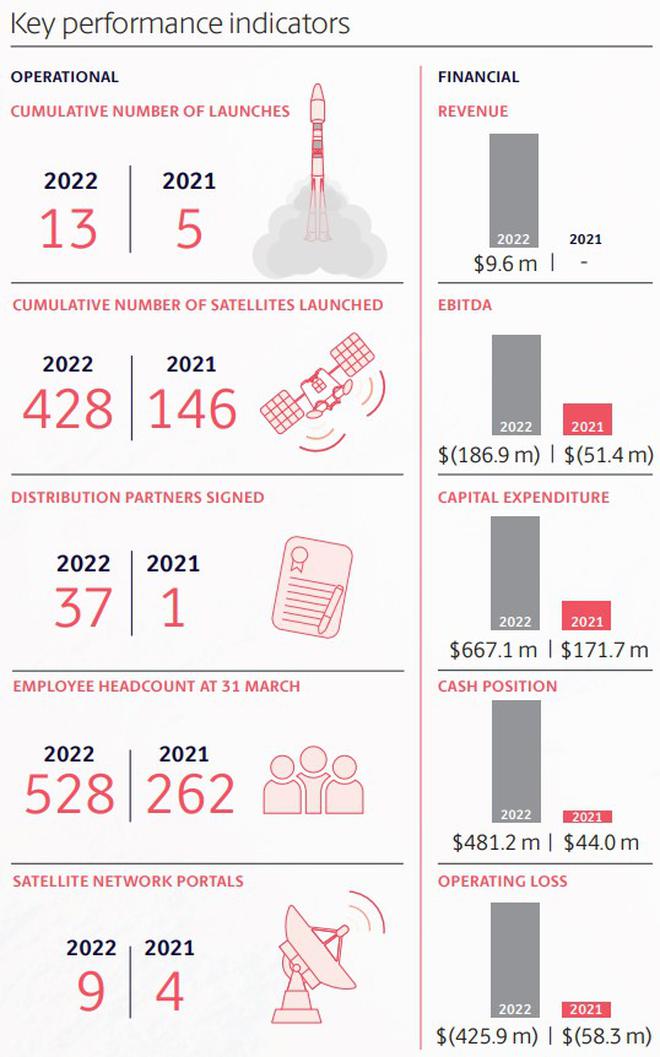The story so far: Satellite communications company OneWeb on Tuesday announced the arrival of 36 satellites at the Satish Dhawan Space Centre in Sriharikota for its joint venture with NewSpace India Limited (NSIL), the commercial arm of Indian Space Research Organisation (ISRO).
With the next launch, OneWeb will have placed 70% of its planned number ofGen 1 low-earth orbit (LEO) satellites in orbit as part of its high-speed global broadband programme.
The OneWeb-NSIL partnership
The launch of the next round of OneWeb satellites will be the company’s 14th overall and the satellites will be carried onboard GSLV-Mk III, ISRO’s heaviest rocket. One additional launch will take place this year, while three more are planned for early next year to complete the satellite constellation and achieve the setting up of a global broadband internet service by the end of 2023. The company’s services are already available in Alaska, Canada, the U.K., and the Arctic region.
In October 2021, OneWeb had signed a letter of intent (LoI) with NSIL as one of the potential platforms to launch its satellites.
India’s Bharti Enterprises, which owns Bharti Airtel, is a major investor and shareholder in OneWeb. Earlier in 2022, Bharti Enterprises announced a joint venture with Hughes Communications India Private Ltd. (HCIPL), to provide satellite broadband services in India. OneWeb aims to help in bridging the digital divide in India.
Radhakrishnan Durairaj, chairman and managing director of NSIL, called the partnership with OneWeb a “historic moment” for NSIL and ISRO. “We are excited to see the arrival of the satellites and the ground support equipment in India in preparation for the launch. Teams at NSIL/ISRO are sincerely working towards providing the best of the launch service solutions and support for OneWeb satellites,” he was quoted as saying.
“We are proud of our ability to adapt and remain on track to deliver global connectivity in the hardest-to-reach places. With many thanks to our top-of-the-line partners ISRO and NSIL, as well as our shareholder Bharti Global for their continued stewardship, we were able to facilitate this upcoming pioneering launch in Sriharikota, India,” said Neil Materson, CEO of OneWeb.
What is the OneWeb satellite constellation?
The OneWeb satellite constellation is a planned network of 648 LEO satellites, aimed to deliver “high data throughput, low latency, and true global coverage to the poles”. The project is the brainchild of London-based communications company OneWeb.
As the name suggests, low-earth orbit satellites remain relatively close to the earth’s surface, usually at an altitude of less than 1,000 km. They are mostly used for telecommunication and satellite imagery.
The first six satellites of the OneWeb constellation programme were launched on February 27, 2019 off the coast of French Guiana onboard a Russian Soyuz rocket. After that, more launches took place throughout 2020 and 2021. The latest launch placed 34 satellites in orbit in February 2022, bringing the total in-orbit constellation to 428 satellites – 66% of the planned network.
What is NSIL?
NSIL is the commercial arm of the Indian space agency ISRO. It was incorporated in March 2019 and is under the administrative control of the Department of Space (DOS) of the Government of India.
NSIL operates to fulfil business demands in the space sector, including building launch vehicles through Indian industries, providing launch services, satellite building and associated ground services, technology transfer, and satellite-based services. Its mission is to enable Indian industries to develop a high-technology manufacturing base for space programmes.
Currently, NSIL has an authorised share capital of ₹100 crore and a paid-up capital of ₹10 crore.
Impact of Russia-Ukraine crisis
Prior to February 2022, all of OneWeb’s satellites were launched onboard the Russian Soyuz rocket. After Russia invaded Ukraine in February 2022, a slew of sanctions were placed on it by countries like the U.S. and members of the European Union. The sanctions also impacted suppliers who engaged with Russian companies, causing an impact on OneWeb’s supply chain, and indirectly, on its constellation service.
The next round of satellites was scheduled to be launched on March 4, 2022 from the Baikonur Cosmodrome in Kazakhstan – a launch site for space missions that has been leased to Russia. Two days before the scheduled launch, Roscosmos, the Russian space agency, announced that it would cancel the launch from Baikonur unless its two demands were met – firstly, that the U.K. government divest its stake in the company, and secondly, that OneWeb provide an assurance that the satellites will not be used for military purposes. The board of the company postponed the launch as well as five future launches that were scheduled to take place from Baikonur.
The Russia-Ukraine crisis also caused OneWeb’s operating loss to increase by a whopping 631% in comparison to the previous year. The impairment was a result of the postponement of the March 4 launch as well as the launches scheduled for the future, the loss of satellites not returned to the company, and the impairment of a portion of the prepaid launch insurance.

What does the collaboration mean for India’s space industry?
The arrival of OneWeb satellites in India for launch can provide a huge impetus and even more global exposure to the country’s space industry. First-of-its-kind research released earlier this year valued India’s space economy at ₹36,794 crores (approximately $5 billion) for the 2020-21 fiscal year, which is 0.19% of its GDP. India's spending in this sector in relation to its GDP is more than that of China, Germany, Italy and Japan, although less than the U.S. and Russia.
In an interview in June 2022, Principal Scientific Advisor Ajay Kumar Sood spoke about encouraging the manufacturing of satellites in the private sector to tap its “full potential.”
“In 2022, the space sector is witnessing what the information technology sector experienced in the 1990s. We will have our own SpaceX in the next two years,” he said.
So far, ISRO has earned $279 million in foreign exchange by launching satellites for global clients through its commercial arm.







